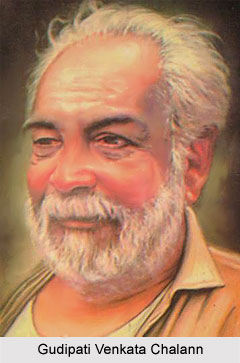 Gudipati Venkata Chalann was born in the year of 1894. He was a romantic rebel, who devoted much of his work to project women`s problems. He was mainly concerned to secure the woman`s position in male-dominated society. Both in reinterpretations of myth and his own original writing, he dismissed the age-old traditional outlook on gender issues. With insight, daring independent thought, and incisive language often featuring a satirical tone, he remained the best crusader for women`s emancipation at a time they themselves had not awoken to it.
Gudipati Venkata Chalann was born in the year of 1894. He was a romantic rebel, who devoted much of his work to project women`s problems. He was mainly concerned to secure the woman`s position in male-dominated society. Both in reinterpretations of myth and his own original writing, he dismissed the age-old traditional outlook on gender issues. With insight, daring independent thought, and incisive language often featuring a satirical tone, he remained the best crusader for women`s emancipation at a time they themselves had not awoken to it.
Career in Theatre for Gudipati Venkata Chalann
Gudipati Venkata Chalann started his career with a series of one-act plays. In three of them such as; Satyam, Sivam, Sundaram i.e. "Truth, Goodness, Beauty" in 1921, he attacked the ethics of a society that discriminates between men and women on the question of marital ties. His twenty-six one-act works, covering a large thematic range for Telugu theatre, show how men are dishonest and deceitful in building a moral code. In Bhanumati in 1931, he portrayed a very powerful character in Duryodhana`s wife who finds fault with her husband for insulting Draupadi but, at the same time, reprimands Draupadi for not following court conduct. Chalam`s longer plays, though championing the cause of women`s liberty, deal with noble themes of human love, both physical and spiritual. Chitrangi in 1921 presents a queen who loves her stepson, for the king married her against her wishes. Similarly, in Sasanka in 1926, Chalam approves of the love between Tara and Sasanka. In Mangamma in 1930, Jayadeva in 1935, Tyagam i.e. "Renunciation" in 1935, and Vidakudu i.e. `Divorce` in 1938 he pleads for openness in sexual relations, where mutual love and devotion should be the only guiding principles. His last play, Pururavas in 1947, argues that spiritual realization can only be achieved through free, unbridled love as that between Pururavas and Urvasi.
A man who shunned secrecy and encouraged liberalism in human relationships, Chalam left a tremendous impact on the younger generation of readers. He is also known for his simple yet powerful prose, which forcefully expresses his ideas on women`s freedom in loving and living. In later years, he became Ramana Maharshi`s devotee, spending his time at Ramana`s ashram.




















